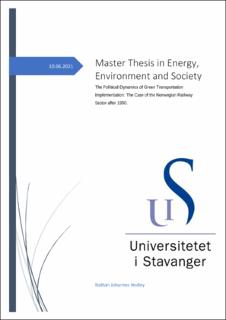| dc.description.abstract | Norway, like all other large economies, needs to drastically reduce emissions to combat climate change. The oil and gas industry, which Norway is very invested in, is unlikely to be phased out in the near future. This calls for alternative solutions for emission reductions, especially the transportation sector, which is one of the most polluting sectors of the Norwegian economy. Sustainable public transportation can help reduce these emissions by moving passengers and freight from polluting forms of transportation like airplanes and cars, to railways and electric buses. However, achieving this can prove to be difficult, because political agendas get in the way of creating a sustainable public transportation sector.
The Norwegian railway has since the 1990s changed drastically, due to the European Unions Railway packages, and because of neoliberal ideology, which some of the largest political parties have adopted into their political agenda. Using discourse analysis, this thesis looks at how actors have framed the development of the railway discursively, in order to push for deregulation of the entire sector. Two discourse coalitions are identified, each with its own agenda. How have the narratives of these coalitions impacted development of the railway? And what implications could the recent policy changes have, which were enacted by the dominating coaliton? The EU railway packages are seen as an underlying cause and facilitator of the deregulation policy, which was introduced as the ‘railway reform’ in 2015.
The policy has put the majority of the railway sector on public tender, and opened up full competition between train operators. Two discourse coalitions have been discovered, one of which is the proponent of the reform policy, namely the sitting conservative government. The coalition opposing the policy is the majority of the left-wing parliamentary opposition parties, and the various railway worker unions. Most of the focus in the analysis is given to the conservative coalition, because the rhetoric used is very ideologically charged. The narrative of the reform coalition is seen in context of the emergence of neoliberal ideals, more specifically the conceptual framework of ecological modernization by Maarten Hajer (1997).
The political contestation and the resulting ideological railway reform policy is seen as an impediment to the development of the railway, which one of the best options for reducing emissions in the transportation sector. Due to being a member of the European Economic Area, Norway is required to adopt certain amounts of EU legislation, which is why all of the EU railway packages have been adopted so far. However, studies have shown that these packages don’t work for all countries, and that there is no “one size, fits all” in organizing a large sector such as the railway. Thus, the narrative used by the dominating discourse coalition can have resulted in weakening the sector, and making it path dependent. | |
